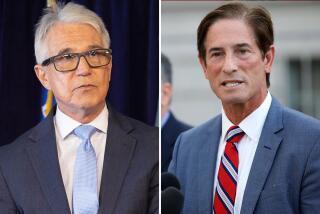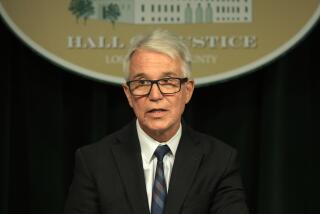D.A., Challenger Clash in Acrimonious Debate
- Share via
In a debate that began placidly but took a sharp turn for rough seas, district attorney candidates Gil Garcetti and Steve Cooley clashed Thursday night over issues that included cameras in court, gag orders and handling of the death penalty.
In one of the most acrimonious exchanges of the campaign, Cooley at one point accused Garcetti, the incumbent, of violating his oath and embarrassing the office, leading Garcetti to accuse Cooley--one of his top assistants--of engaging in “despicable” attacks.
The debate, held at the Los Angeles Times and sponsored by news media and legal organizations, was ostensibly devoted to exploring the candidates’ positions on media law issues such as gag orders and cameras in courtrooms.
The two candidates did discuss those issues, but the debate eventually strayed into Garcetti’s handling of some controversial cases.
The candidates also sharply disagreed about whether it is appropriate to have television cameras at trials. Garcetti said he had been a strong supporter of televised trial coverage, but that his experience in the O.J. Simpson case caused him to reverse his stand.
“I’ve gone 180 degrees from that,” he said. “I’ve concluded--respectfully concluded--that cameras in the courtroom don’t belong there.”
Cooley disagreed. “As a matter of principle, cameras should probably be in the courtroom,” he said. “The public should see what’s going on there.”
Disagreement on Use of Gag Orders
Asked whether they would make a distinction for still photography, Garcetti--an avid amateur photographer--said he probably would. Cooley said the principle remained the same.
The two also disagreed about gag orders, which Garcetti’s office has sought in the high-profile Sarah Jane Olson bomb plot and Rampart police corruption cases. The request was denied in the Rampart case, but was granted and later lifted in the Olson case after several violations, including one by Garcetti himself.
Cooley said that as a prosecutor, he would never seek a gag order, which prohibits the lawyers and others involved in a case from speaking about it publicly.
“Gag orders are inappropriate tools for doing the public’s business,” he said.
Garcetti expressed embarrassment for his own violation of the Olson gag order, which he said was inadvertent, but said he thought such orders were sometimes appropriate.
Asked about the death penalty, Garcetti said that he believed in using it judiciously, and that his office sought it in only about 21% of the cases in which the defendant was eligible. Cooley charged that the office obtained the death penalty in just 17% of the cases in which it sought it. And he said the decision to seek it is made by a panel of “essentially white males, elderly, longtime administrators” and called for more diversity in the panel. Garcetti accused him of “disparaging our colleagues.”
The most hostile exchange came in a discussion of a case involving an accused arsonist whose grandfather was a contributor to Garcetti’s 1996 reelection campaign. Brian John McMorrow received 16 months in prison in a case in which he was eligible for a life term.
His voice rising, Cooley told Garcetti: “You have done us a disservice, you have embarrassed us, you have violated your oath.” He accused Garcetti of “a complete ethical failure in this case.”
Garcetti said the case had been handled by deputies who had no reason to be influenced by the campaign contribution.
“There is no prosecutor that I know of who would engage in deliberate, unethical conduct,” he said. “When I have deputy D.A.s . . . whose credibility is impugned in the fashion that Mr. Cooley and his cohorts have being doing, that’s despicable.”
More to Read
Get the L.A. Times Politics newsletter
Deeply reported insights into legislation, politics and policy from Sacramento, Washington and beyond. In your inbox twice per week.
You may occasionally receive promotional content from the Los Angeles Times.










